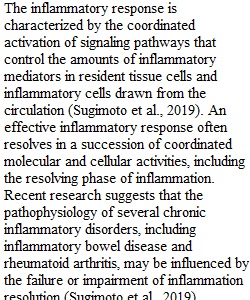


Q HLT 410 – Inflammation and Immunity Assignment: Inflammation and Immunity Instructions Purpose: Demonstrate your knowledge of the immune system and the inflammatory response. The body utilizes immune defenses in a number of ways to defend against and respond to cellular injury. This assignment will require you to apply your knowledge of the immune system and immune response in the context of pathophysiology. To prepare for this assignment, you should: ? Read Chapters 5 and 6 ? Read additional lesson readings in the course content folder. To complete this assignment, respond to the questions below in 1-2 short paragraphs each. Provide citations and references for sources used. 1. Provide an image that represents an inflammatory response, along with a brief explanation of the image. Cite/reference your image properly. 2. Explain how inflammation can be helpful and how it can be harmful. Differentiate acute and chronic inflammation. 3. In your own words, compare and contrast the terms inflammation and infection. Provide a specific example of each. 4. Describe two ways in which immunity develops or is triggered within the body. Provide a concrete example of each. 5. Explain why it is sometimes necessary to suppress inflammation. Provide an example of a situation where this might occur. 6. Choose an autoimmune disorder that you have encountered in the patient populations you work with. a) Describe the pathogenesis of the disorder b) List common clinical signs and symptoms of this disorder. c) Identify tests used to diagnose the disorder. d) Describe your potential role as a healthcare professional if you were involved in this patient’s care. Submission Instructions ? Save your file as a Word document (.docx). ? Include the term Immune and your Last Name when saving your file. Example: Immune_Garcia.docx ? Upload your completed document using the Browse button, and then click the Submit button
View Related Questions